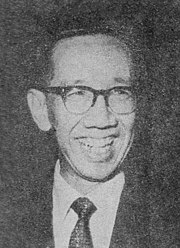
The Socialist Party of Indonesia was a political party in Indonesia from 1948 until 1960, when it was banned by President Sukarno.
The Berkeley Mafia was the term given to a group of University of California-trained economists in Indonesia who were given technocratic positions under the Suharto dictatorship during the late 1960s. They were appointed in the early stages of the New Order administration. Their work focused on promoting free-market capitalism in Indonesia and reversing many of the progressive economic reforms that had been introduced by the Sukarno government. The economic system in place under the New Order regime was termed crony capitalism due to the vast corruption within the country throughout this period. The Berkeley Mafia, like the Suharto dictatorship itself, aligned with the United States during the Cold War.
Andalas University is a public research university in Padang, West Sumatra. Andalas is one of the major public institutions of higher learning in Indonesia, and the oldest outside the island of Java. The university is known for its excellence in social sciences and medical program, and has produced numerous distinguished alumni in public and private service. In November 2019, Andalas was ranked fourth best Indonesian research university from a nationwide evaluation conducted by the Ministry of Research and Technology.

Burhanuddin Harahap was an Indonesian politician and lawyer who served as prime minister of Indonesia from August 1955 until March 1956. He was a member of the Masyumi Party and served as Minister of Defense concurrently with his tenure as prime minister. Afterward, he took part in the unsuccessful Revolutionary Government of the Republic of Indonesia (PRRI) rebellion in West Sumatra.

Sjafruddin Prawiranegara was an Indonesian statesman and economist. He served in various roles during his career, including as head of government in the Emergency Government of the Republic of Indonesia, as Minister of Finance in several cabinets, and as the first Governor of Bank Indonesia. Sjafruddin later became the prime minister of the Revolutionary Government of the Republic of Indonesia, a shadow government set up in opposition to the country's central government.

The First Amir Sjarifuddin Cabinet was the fifth Indonesian cabinet and was in office from 3 July to 11 November 1947.
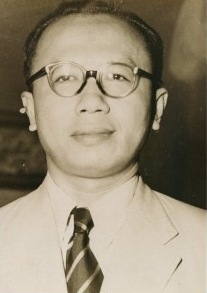
Djuanda Kartawidjaja, more commonly referred to mononymously as Djuanda, was an Indonesian politician and technocrat who held various positions during the presidency of Sukarno, most notably as prime minister of Indonesia and a cabinet minister in several cabinets.

The Natsir Cabinet was the first cabinet formed after the dissolution of the United Republic of Indonesia and returned to the Unitary State of the Republic of Indonesia. This cabinet was in charge from 6 September 1950 until 20 March 1951.
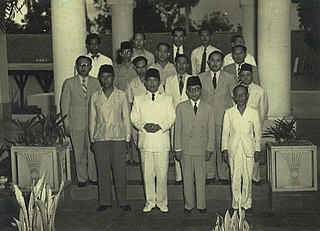
The Soekiman Cabinet, also known as the Sukiman-Suwirjo Cabinet, was an Indonesian cabinet that served from 27 April 1951 until it fell on 23 February 1952 following revelations that it had signed a mutual security agreement with the United States, and was dissolved on 3 April 1952.

The Wilopo Cabinet, also known as the Wilopo-Prawoto Cabinet, was an Indonesian cabinet that served from 3 April 1952 until 30 July 1953.

The Second Ali Sastroamidjojo Cabinet, also known as the Ali-Roem-Idham Cabinet was an Indonesian cabinet that served from 24 March 1956 until 9 April 1957.

The Djuanda Cabinet, also known as the Working Cabinet, was an Indonesian cabinet that served from 9 April 1957 until 10 July 1959, when it was dissolved by a decree from President Sukarno.

The Second Working Cabinet was an Indonesian cabinet that served from 18 February 1960 until 6 March 1962, when President Sukarno reshuffled it.

Widjojo Nitisastro was an Indonesian economist, who was known as the main architect of the Indonesian economy during the New Order regime of President Suharto, serving as Minister for National Development (1971–1983) and Coordinating Minister for Economy, Finance and Industry (1973–1983). He was one of Indonesia's best-known and most respected economic policy-makers, both within Indonesia and overseas.
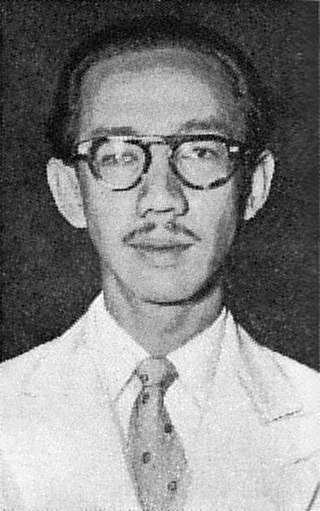
Sumitro Djojohadikusumo was an Indonesian statesman and one of the country's most influential economists. He held ministerial positions under Presidents Sukarno and Suharto intermittently between 1950 and 1978. During his career in government, Sumitro served as Minister of Industry and Trade, Minister of Finance, and the Minister of Research in five different cabinets. He was also the Dean of the Faculty of Economics at the University of Indonesia.

Hashim Djojohadikusumo is an Indonesian entrepreneur and politician. He is the younger brother of Indonesian president-elect Prabowo Subianto. In 2014, he was considered a billionaire. As of December 2020, Forbes estimates his net worth at $800 million.
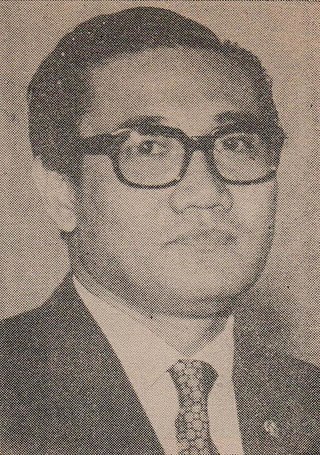
Ali Wardhana, more colloquially known as Bung Ali, was an Indonesian professor and economist, who served as the third Coordinating Minister for Economics, Finance, Industry, and Development of Indonesia from 1983 until 1988 and the 21st minister of finance of Indonesia from 1968 until 1983. He was one of Indonesia's most senior economic policy-makers during the New Order regime of President Suharto, being a member of the influential Berkeley Mafia, a group of American-educated Indonesian economists who shaped the Indonesian economy during the New Order. He was the longest-serving Minister of Finance, as well as the fifth longest-serving minister in Indonesian history.

The First Working Cabinet was an Indonesian cabinet that served from 10 July 1959 until 18 February 1960, when President Sukarno reshuffled it.
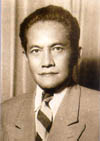
Sunarjo Kolopaking, sometimes spelled as Sunario Kolopaking, was an Indonesian lawyer and sociologist. He was appointed as Minister of Finance in 1945, though rejecting the post, and he later became one of the first Indonesian professors at the University of Indonesia.
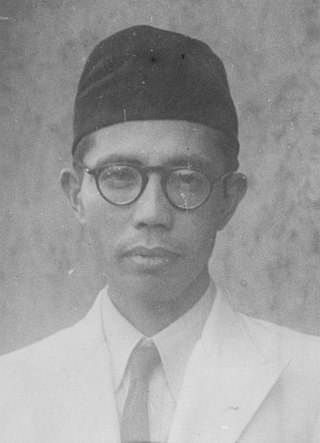
Jusuf Wibisono was an Indonesian politician and economist. A member of the Masyumi Party, he served as Minister of Finance from 1951 until 1952 and again from 1956 until 1957, under the Soekiman and Second Ali Sastroamidjojo cabinets. Originating from Magelang, Wibisono took part in Islamic organizations in the nationalist movement from his school years. He joined Masyumi during the Indonesian National Revolution, and became a leading member within the party despite disagreements with other party leaders such as Mohammad Natsir. In both of his tenures as finance minister, he relaxed the tight budgetary controls of his predecessor, and provided favors to political parties.
